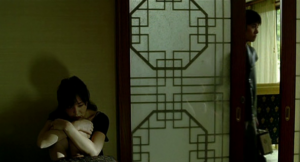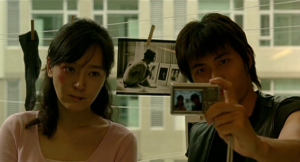3-Iron (Bin-jip) (Kim Ki-Duk) (2004)
3-Iron (Bin-jip) (2004)
Directed by: Kim Ki-Duk in 2004
3-Iron is the movie that meant international success for it’s director, Kim Ki-Duk, and, in some aspects of it, also poetic maturity.
The plot revolves about the life of a young man riding a motorcycle and seeking which houses are left empty for some days. After he detects them, by leaving some publicitary leaflets on the door handles and coming back some time later to check if they have been torn away, he lives for some days in them, with great care and respect and then, silently without leaving a trace, taking only a photo of himself in the house before vanishing, leaves for the next house. But one day, by surprise, he actually meets someone in a house he thought was empty. A young woman, abused by her violent husband…
3-Iron is a movie quite distant from the excesses and extremes for which Kim Ki-Duk is famous to the general public, it’s, on the contrary, like a small poem about silence (which is, de facto, the third main character), about the difficulty to belong to the world and the very subtle relationship between one’s interiority, portrayed in both poetic creativity and imagination, and outer reality.
The director himself stated in an old interview that one of the possible keys to read the movie (he refused to provide a definitive one, stating that his movies are shot to encourage free interpretation and not to vehicle a fixed, monolithic message) is the one of a double dream of the two main characters (a very interesting interview with Kim Ki-Duk about 3 Iron can be found in the link section at the end of the page).
I find that this is a very interesting clue about the ambivalent, open and bittersweet nature of 3-iron. The use of imagination in it is wonderful,sweet and dream-like, but also filled with sadness for a cruel and violent world and the incredible difficulty, often ending with failure, to find a proper place in it. Imagination and dreams are signs both of alienation and freedom, a way to live a more fruitful life but also a way to escape the difficulties and the shadow sides of it. Neither of these two aspects thriumps fully over the other, the movie’s poetry stand exactly in the constant swing and balance between these two sides, and the sense of fullness and going beyond words and concepts that this movement provides. It also helps that the movie is for the greatest part silent, the relationship are conducted by glances, body language and deep empathy and understanding between the two main protagonists.
The movie lives on ambivalence. The main protagonist both carries in himself the desire, married with the goodness of heart, to live simply and with respect the life of the people in which houses (and lives) sneakes in for a brief period of time. The desire to both live more than one life, outside himself, and to disappear, to become invisible, like thin air.
At a certain point of the movie, we learn that he has a degree, so he hasn’t been always an outcast. What did it lead him to this decision, to avoid commitment and to live like an eternal wanderer, a spirit ? To live briefly the life of others because one own has never been found or lost. We never know.
We have two ways to read this, and are both correct: on one hand, sensibility, creativity, freedom. On the other hand, difficulty to live, isolation, deep solitude. Only a similar person can relate to this.
So the metaphor of the double dream again pops up in it’s ambivalency: a relationship very deep and beyond words, an immediate understanding, but also the product of two very hurt and very lonely people and their solitude.
3-Iron put a strong accent in the dialogue and co-existence of contrasts and the harsh side of life: the relationship and the vision of outside world often appears mediated by violence, both of the others (the abusing husband, the corrupted policeman) and of one’s inner drives and impulses (the habit to play golf with the ball tied of the main protagonist, a way to discharge and live his own rage and desire to aggression, which, not by chance, the girl tries to mediate or the overall neuroticism and coldness that prevails in the families that live in the houses that the two visit).
The dimension of inner violence is not without consequences, and the sequence in which a girl is hurt by the escaping golf ball tells us so. While violent and difficult, the world is not completely chaotic, there is a resonance of one’s inner world in outside reality and vice-versa in a very complicated tangle.
Another Kim Ki-Duk’s recurring theme (told in much less extreme and graphical tones in comparison to other works) can be found in the how society’s institutions are portrayed, they are merciless and imprisoning, a vehicle of isolation that increment the ultimate desire of the main protagonist to disappear completely, mastering the art of outer invisibility, moving with shadows, not seen by anyone that he doesn’t desire.
Love is the life-giving and transformative element of the movie. In 3-iron, love borns out of silence and it means completeness (the two lovers end in weighting zero together on the scales for this reason, symbolizing what has been written above about ambivalency and co-existence of opposites). Love makes the two to go beyond the suffering but not to deny or cancel it, since is suffering that made the encounter possible in the beginning and still the girl lives with the abusing husband, who is portrayed with simplicity and compassion in all his frailty and the nothingness of a life devoted to the illusion of exterior success and false image of social happiness and integration.
3-Iron puts the most of it’s emphasis on the “empty” elements: silence, the nearly complete absence of a soundtrack, with the exception of a single composition that has the function of a trait d’union between the different travels and places, the great spaces and, in the end, the definitive coming together on a unique plane of imagination and reality. It all brings towards a radical doubt about what we can really say or abstractly know about reality itself, but that is a doubt that doesn’t end up in nihilism. On the contrary, it brings to creativity, because that impossibility to fully know becomes a new relation with reality and not a simple absence of something (the two lovers weighting zero together on the scales is a wonderful symbol for it), it’s a symbol and not an abyss to explore.
In the end, a great movie that dwells the land of poetry.



